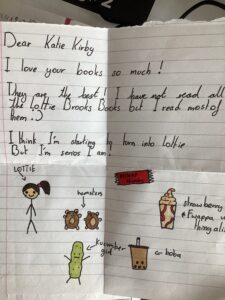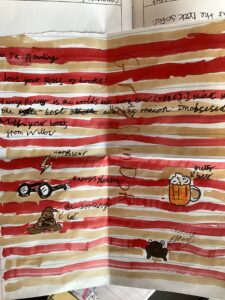Our new spellings focus on the days of the week, each containing one of our Phase 5 sounds: “ay”. The children will have their test on Friday 8th November.
- Monday
- Tuesday
- Wednesday
- Thursday
- Friday
- Saturday
- Sunday
Help at home
- Practise writing each day of the week, reminding them that days are proper nouns and need a capital letter.
- Say the days aloud together, emphasizing the “ay” sound.
- Use flashcards.
- Look, say, cover and check!

Regular spelling practise at home can make a real difference!
Living and Learning: I take part in democratic decisions.
This week, our living and learning statement is:
I take part in democratic decisions.
Over the half term, we’ve learnt lots about democracy already (through our history topic). We found that democracy originated in Athens during their Golden Age (800-500BC). We also know that democracy means ‘power to the people’ – a fitting name indeed!
In our country, we’re beginning to understand what voting means and how new laws are written. The children have understood that, when voting for a new prime minister, areas often vote for a leader to represent them.
Next week, our whole school will be taking part in a democratic vote to nominate new members for our Junior Leadership Team! In class we’ve spoken about what makes a good leader and some questions we might (and might not) ask to find out who to vote for. Here’s a few examples below:
Good examples:
Are you confident talking to lots of people?
Are you kind to everyone around you?
Are you a good listener and will you let everyone have a say?
Questions to avoid:
Who’s your favourite footballer?
What’s your favourite dinner?
Help at home:
Encourage your child to try out for a place on the Junior Leadership Team! Help your child create and practise a speech to persuade their classmates to vote for them. What characteristics someone might need to be a good leader? How could you show them off to your class?
Reading Record
Just another little reminder to encourage your child to read weekly at home. Your child can complete reading activities in their reading records. Please sign to say that they have been heard read. It would be great to have 100% of children reading at home and completing activities.
Recently, some children have written a letter to their favourite author – a really creative way to display their understanding of what they have read.


Maths
This week, we have been finding factors of a number. A factor is a number that divides another equally, with no remainders.
For example:
Factors of 12 – 1, 2, 3, 4, 6, 12
Factors of 15 – 1, 3, 5, 15
We have been also identifying common factors.
So, common factors of 12 and 15 are 1 and 3.
In addition to this, we have learnt what makes a prime number. A prime number is a number that is only divided by itself and 1.
Help at home – What are the factors of 45/36/9? Can you list all the prime numbers up to 20? List all the prime number between 30 and 40. What is a common factor?
Maths – Ordering Numbers
In maths this week, we’ve been learning to order numbers by comparing the number of tens and ones.
Today, we took advantage of the sunny weather and took our maths learning outside. The children were each given a number and had to arrange themselves in order, first in small groups…


…then all together.



This task required much more than just maths knowledge: leadership, teamwork, patience. There were plenty of skills on display!
Help at home by challenging your child to order some 2-digit numbers. Check for understanding by asking them ‘How do you know?’. Ask them to tell you about the number of tens and ones in each number.
Try this fun ordering game.
Stay and Learn; Phonics Phase 2 10.10.24
A big thank you to parents and carers who joined us on Wednesday for our Phonics Phase 2 Stay and Learn session. We hope you enjoyed watching a lesson in action, taking part in some activities with your child and that the teacher presentation was informative.
Here’s some more information about phonics and reading in Reception…
What do reading groups look like in class?
Children read with an adult at the same time each morning. They look at the same book throughout the week, in groups of 6 or less. We usually read 4 times a week (Mon-Thurs). The current week’s eBook is usually issued by Friday evening.
Day 1/2- Decoding– children are introduced to new vocabulary, key decodable words (words that can be segmented and blended) and read through the book together. The aim is to work towards automaticity (reading the words on sight/memory recognition), which in turn makes reading more fluent.
Day 3- Prosody– prosody is the patterns of stress, intonation and rhythm in speech (i.e. sounding like a story-teller!) this is modelled to the children and they are taught to spot features in the text that will affect the way we read the words (for example; how is the character feeling? is there an exclamation/question mark or other grammatical features? and briefly pausing when we see a full stop)
Day 4- Comprehension– the children will be asked a range of questions to check their understanding of what they have read. These can usually be found on the last page of the eBook, if you’d like to use them at home as talking points.
Reading reports and Keeping in Touch
Teachers will check reading reports each week and will make ‘keeping in touch’ phone calls to those who have not read within the week, to see if we can offer any further support. You can also ask your class teacher at any time, if you are having issues accessing reading at home.
Reading records
Please remember to send your child’s reading records to school each Thursday. Please add a short comment about how your child has been getting on with their reading at home. Remember, this can also be about other reading as well as eBooks.
Feedback
Finally, another thank you to those of you who attended the Stay and Learn. We would love your feedback!
Thank you
Writing: dictation
We’ve made a great start to our week with some fantastic writing in Year 1. Each day we practise our handwriting and write some words, captions/sentences about a picture.




Help at home:
Using the pictures below can your child write some words, captions or sentences.
Ask them about the process and how they do it school. I’m sure they’d be happy to share with you how skilful they are at counting the words in the sentence and using their Phoneme Fingers to listen for sounds in words. You could also include some tricky words or some of your child’s spelling words.


MindMate – Self Esteem
Thursday was World Mental Health Day. We invited MindMate Support Team into school to deliver workshops to the children about self-esteem and how to get help if they’re feeling sad or have low mood. Year 3 responded to this learning really well – they learnt new ways to help tackle tricky feelings and how to turn them into positive ones. On Friday, the same team delivered a workshop to parents about supporting children with self-esteem and the feedback was positive.
Here are a few pictures from our class workshop:


Help at home:
Talk with your child about any feelings of sadness or low self-esteem that they may have experienced. Your child should have brought home their posters on self esteem – use this as a talking point to flip those feelings into positives.
Oh no, we’ve got to go through it!
This week our focus story has been ‘We’re going on a bear hunt‘ by Michael Rosen.
Throughout the week, the children have been able to predict and recall key parts within the story.
We decided to join in and create our own sensory walk!

Help at home: Can you tell your grown-ups the different environments the family had to go through to find the bear?
Sticking to our outdoor theme, we talked about the artist Andy Goldsworthy. Andy is a British sculptor and land artist; he finds his inspriation from nature and uses this to create his art. The children enjoyed looking at the bright coloured leaves and enjoyed trying to figure out what materials Andy had used.
We had a go ourselves. Here is some of our own Andy-inspired artwork!

Have a happy and healthy weekend!
The Nursery team 🙂
Henri’s Scissors
It has been another fun filled week in reception this week, our focus book has been Henri’s Scissors by Jeanette Winter a biography about the artist Henri Matisse.

We have been artist and created our own piece of artwork in the style of Henri Matisse. We used our cutting skills to cut up shapes to add to our pictures just like Henri did.
Poetry Picnic
This week our poem was Leaves are Falling.
Leaves are falling, leaves are falling,
One fell on my nose.
Leaves are falling, leaves are falling,
One fell on my toes.
Leaves are falling, leaves are falling,
One fell on my head.
Leaves are falling, leaves are falling,
Yellow, Orange, Red.
Phonics
This week, we have learnt the phonemes (the sounds a letter makes) ck, e,u and r. We’ve also learnt a new tricky word; I.
Help at home: Look out for a ‘learn at home’ sheet which recaps the phonics learning from the week. Please look at this with your child and complete the activities.
Maths
In Maths, we’ve been using our subitising skills to identify patterns to 4. We even tried to listen to how many sounds we could hear – without counting. We have investigated different ways of making 4, using multilink cubes. This was lots of fun and definitely bit of a challenge.
Next week our focus book is Leaf Man by Elois Ehlert.

Help at home – autumn leaves and conkers.
If you go on a walk this weekend, we’d really appreciate donations of dry leaves to help us with an art project next week. We also need some conkers to use in our maths learning – see how many you can find! Thank you for your support.
Have a happy and healthy weekend and please don’t forget to email any pictures from home to stjames@spherefederation.org thank you as always for your support.
Mrs. Kendrew, Mrs. Rippon and Miss. Feldman and Mr. Smith.